
Alexander Ferrar ‘95
What year did you graduate and what major were you?
I was there for the 1st three years. I was class of 95, and I got accepted for both communications and visual, and I grew up to be an author and a neo-classical painter. Like we were, it was all so new, and we were all figuring things out. We were trying to find ourselves and where we fit in, and all of us were misfits at our schools. We got to be ourselves for the very first time with one another.
Tell us a little bit about your profession right now. What are you doing?
I live in Antigua, Guatemala. I left the US a long time ago, and when I was a kid, I loved to read adventure books. And, I really wanted to write adventure books too, but I didn't know anything. Now how do you get mixed up in adventures in this day and age? Go to a different town, go to a bar, meet different people, get embroiled in their drama, and adventure will surely ensue. And so, I basically did everything that my parents told me not to do, and then went on a bunch of adventures that later became books. I came to Guatemala on an adventure, which I won. Two months before my return ticket, I met a girl, and I stayed. And I really liked this city. After a year, the book was done, and the girl that I met, who would later become my wife, convinced me to open an art gallery restaurant. And I thought, yeah. That's what I wanna have. I want a place to hang my own paintings and also a way to help local artists as a way of giving back to the community. And we'll have this rotating decor that's for sale, and we'll take a small commission out of all of the art. I'm up to 23 books published, by the grace of God, and the restaurant is at the corner of Central Park, Antigua, in a destination hot spot.

Can you talk maybe more about where your inspiration comes from?
I believe that all art is a means of communication. For the last 100 plus years, art has stopped being, ultimately stopped being, about communication. If anything, it's communicating nothing, and that's something I strongly disagree with. I feel that a painting, for example, should tell a story or convey a message to people that either don't speak the same language as you or who will view it many, many years after your death. So, you won't be there to explain it to them. Because of that, I feel if a painting can be interpreted many different ways by many different people, the artist has failed. So, because we have that saying a picture is worth 1000 words, I feel it should be. I feel it should tell a story. And I try to have a very complicated story, but one that you can figure out if you spend time looking at it, a story that can be told through its details.
How has being a student of Dreyfoos transformed who you are and the artist that you are today?
So, I had some of the best teachers anybody could hope for. I wish that if I had them as teachers now, then I would appreciate them. When you're still young enough to think you know everything, (you think) an adult can't tell you anything. And so, I just didn't appreciate them as teachers at the time. And I really wish that I could go back in time and pay more attention in their classes. When I was old enough to be able to remember what they had said, that completely transformed me, not just as an artist and as an author, but as a person.
Are there any key moments that you recall from Dreyfoos pertaining to your teachers?
So when Dr. Bucklew was teaching us Shakespeare, she taught us to understand what the person was, what Shakespeare had actually written, not just to recite words. Dr. Bucklew got us, her students, to actually think about what the author was trying to say and pay more attention instead of just repeating words. And she did that with Steinbeck and with Chaucer. That was a big thing that I remembered from her class, actually learning what the word meant instead of just being bored and going, yeah. I don't understand.

So do you find yourself applying this lesson to your life right now?
In an indirect way (the lesson) taught me empathy. A lot of people complain these days: Oh, well, if you're not such and such, how dare you try to write that kind of a character? You're a white man. How dare you write a woman or a black person or a Jewish person or a gay person? Well, because I have empathy. And what makes me think I have empathy? Because my teachers, my excellent teachers at Dreyfoos, taught me how to think about other people and imagine how they must feel. That gave me the practice to actively think about how other people might feel in order to put myself in the minds of those people, in order to write them well.
Using some of these lessons, do you have any advice you wouls share with Dreyfoos students today?
I'm going to tell them to not act exactly like I did and just like every youngster did in history. This is something that I've been researching a bit. Every generation shakes their head in sadness and disappointment at the generation that follows them saying, “you kids today, you don't know.” You don't know what it's like, and you don't know how good you have it. And the world is going to the dogs. I have been collecting quotes going back every generation, up to 3,000 years ago. The oldest one I have (found) is by a Spartan king, listening to other kings of Greece complaining about how, you know, the world's just crazy today, and no and these kids today, they don't appreciate hard work. Nobody wants to work, and nobody's honest anymore, and, everything's crazy.
And the Spartan king starts laughing, and he goes, then I know the world is fine because my father complained about that, and his father complained about that. And our sons, when they're our age, I guarantee you they're going to say the same thing. And over the next 3,000 years, everybody has said the same thing. Appreciate what your teachers are telling you or at least trying to get through your thick skull before it's too late. Appreciate the time you have now while you're at a school like Dreyfoos.

The Wrong Time for Doubt



